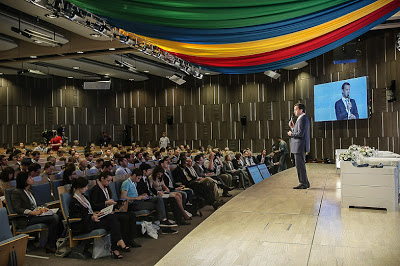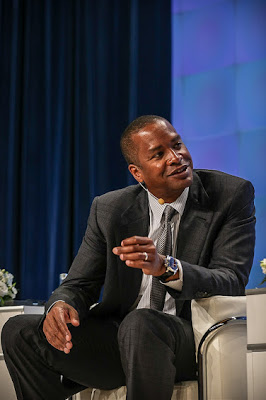International forum Big Tent in Moscow
Peter Baron, director of external affairs for Europe, Central Asia and Africa; Alla Zabrovskaya, Google Russia PR Director
The Internet in Russia is being used more and more actively, and the government pays great attention to the development of infrastructure and electronic services for the population. Today, more than 20 million Russian households have access to the Web. And although the share of the Internet in the national economy is still less than 2% of GDP, small businesses, start-ups and the innovation ecosystem are developing so fast that the contribution of the Internet economy to GDP by 2015 can reach 5%.
These trends and forecasts were discussed at the first Big Tent international forum in Russia - a global discussion on the future of the Internet, which is supported by Google in various countries with the participation of political leaders, scientists, world experts in the field of digital technologies and the media.
')
The Russian Forum was opened by Arkady Dvorkovich , Assistant to the President of the Russian Federation. In his speech, he assessed the impact of the Internet on the Russian economy and noted among the key priorities the development of e-government infrastructure and services, including the interaction of state and society and citizen participation in the development of government solutions through the Internet.

Continuing the theme, writer Jeff Jarvis , creator of innovative data visualization projects Jon Gosier, director of Transparency International Russia Elena Panfilova, and chief editor of the Big Government.RF portal Raf Shakirov discussed how online -activists can be heard offline, how to protect information about users on the Internet and with the help of crowdsourcing to influence government decision-making.
How to stimulate innovation in the BRIC countries? Why do international Internet companies rarely go beyond the US or Western Europe? Should Russia follow the experience of world economic leaders or is it time to invent new business models? These questions formed the basis for the discussion of McKinsey director Jacques Bugen (Jacques Bughin), founder of the ru-Net and RTP Ventures foundations and co-investor of Yandex Leonid Boguslavsky , futurist Mike Walsh and the rector of the Russian economic school Sergey Guriev .
Deputy Minister of Culture of the Russian Federation Ekaterina Chukovskaya moderated a section on digital culture and the regulation of intellectual property online. According to the panelists, the Internet allowed not only to make cultural and historical heritage objects more accessible, but also provided authors with new ways to monetize content. Music critic Artemy Troitsky expressed the opinion that works of art should belong to people like love and air, and rightholders need to adapt to new realities and learn how to profit from digital distribution. In support of this idea, Marc Sands (Marc Sands) from the British Tate Art Gallery (Tate) said that all the exhibits of the museum will be available online, including through the Google Art project .
On behalf of Google, senior vice president of corporate development and senior lawyer David Drummond (David Drummond), who answered questions about how Internet regulation is developing and how Google sees the future of online technology and social communications, including Google+, participated in the forum. and UGC platforms.

Video from the forum will soon appear on YouTube , where you can also find reports from previous events. The next Big Tent Forum will be held this May in London.


The Internet in Russia is being used more and more actively, and the government pays great attention to the development of infrastructure and electronic services for the population. Today, more than 20 million Russian households have access to the Web. And although the share of the Internet in the national economy is still less than 2% of GDP, small businesses, start-ups and the innovation ecosystem are developing so fast that the contribution of the Internet economy to GDP by 2015 can reach 5%.
These trends and forecasts were discussed at the first Big Tent international forum in Russia - a global discussion on the future of the Internet, which is supported by Google in various countries with the participation of political leaders, scientists, world experts in the field of digital technologies and the media.
')
The Russian Forum was opened by Arkady Dvorkovich , Assistant to the President of the Russian Federation. In his speech, he assessed the impact of the Internet on the Russian economy and noted among the key priorities the development of e-government infrastructure and services, including the interaction of state and society and citizen participation in the development of government solutions through the Internet.

Continuing the theme, writer Jeff Jarvis , creator of innovative data visualization projects Jon Gosier, director of Transparency International Russia Elena Panfilova, and chief editor of the Big Government.RF portal Raf Shakirov discussed how online -activists can be heard offline, how to protect information about users on the Internet and with the help of crowdsourcing to influence government decision-making.
How to stimulate innovation in the BRIC countries? Why do international Internet companies rarely go beyond the US or Western Europe? Should Russia follow the experience of world economic leaders or is it time to invent new business models? These questions formed the basis for the discussion of McKinsey director Jacques Bugen (Jacques Bughin), founder of the ru-Net and RTP Ventures foundations and co-investor of Yandex Leonid Boguslavsky , futurist Mike Walsh and the rector of the Russian economic school Sergey Guriev .
Deputy Minister of Culture of the Russian Federation Ekaterina Chukovskaya moderated a section on digital culture and the regulation of intellectual property online. According to the panelists, the Internet allowed not only to make cultural and historical heritage objects more accessible, but also provided authors with new ways to monetize content. Music critic Artemy Troitsky expressed the opinion that works of art should belong to people like love and air, and rightholders need to adapt to new realities and learn how to profit from digital distribution. In support of this idea, Marc Sands (Marc Sands) from the British Tate Art Gallery (Tate) said that all the exhibits of the museum will be available online, including through the Google Art project .
On behalf of Google, senior vice president of corporate development and senior lawyer David Drummond (David Drummond), who answered questions about how Internet regulation is developing and how Google sees the future of online technology and social communications, including Google+, participated in the forum. and UGC platforms.

Video from the forum will soon appear on YouTube , where you can also find reports from previous events. The next Big Tent Forum will be held this May in London.
Source: https://habr.com/ru/post/143253/
All Articles